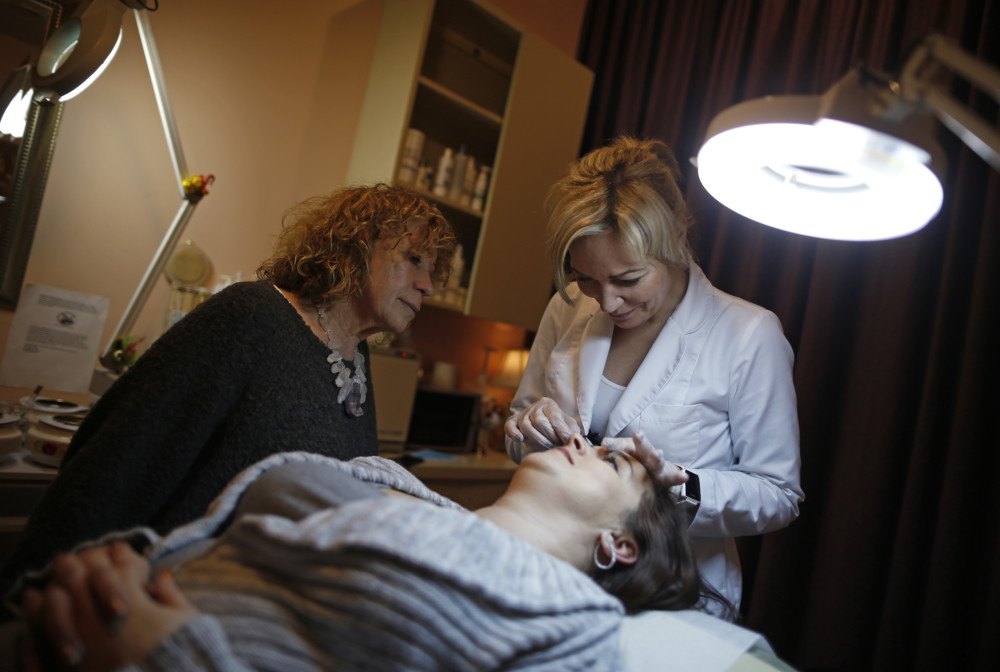By Emily Perschbacher
Chicago Tribune
WWR Article Summary (tl;dr) As columnist Emily Perschbacher points out, “Opening up to a stylist or technician seems to happen naturally. It’s one-on-one time with another human being, and physical touch is involved. And despite any type of confidentiality agreement, there is some comfort in knowing the individual is most likely outside of your circle of friends and family.”
CHICAGO
When Anna Pamula looks to hire an employee for her day spa, she focuses on personality.
“Those who are warm and friendly and open will be the most successful,” she said. In many cases, this trumps technique, she added.
That’s because Pamula has found that repeat clients often come for more than just a manicure, massage or facial; they are looking to engage with their technician.
“I can easily train someone,” she said. “But I can’t teach them to be good with people.”
Pamula, 66, who owns Renu Day Spa in Deerfield, Ill., has been in the beauty industry for more than 30 years. Over the years, she has built relationships with countless clients and listened to their many secrets, including marital affairs, medical diagnoses and financial trouble.
“It’s like confession for them,” she said. “You have to figure out if that person wants to hear from you ‘Yes, absolutely,’ or if they’re waiting for you give them some sort of advice.”
Opening up to a stylist or technician seems to happen naturally. It’s one-on-one time with another human being, and physical touch is involved. And despite any type of confidentiality agreement, there is some comfort in knowing the individual is most likely outside of your circle of friends and family.
“There are a lot of things that go into (the relationship),” said Rebecca Slusher of Balanced Life Counseling in Chicago. “If you think about how we sit with our stylist, we’re not making eye contact, so there’s not a lot of pressure. And, typically, your stylist isn’t going to probe you or encourage you to change your behavior; they just listen.
“There is also a regularity to seeing them, so you begin to feel safe sooner.”
And while Slusher says there isn’t anything wrong with people wanting to share their lives and confide in their stylist, it can be a heavy burden for beauty professionals who aren’t always prepared for these types of interactions.
“Going into the industry at a young age, I didn’t realize how much people would disclose,” said Melaine Johnson, 29, a hairdresser in San Diego. “People really trust their hairstylist. It’s almost like you’re a therapist without the degree.”
Johnson said she has sought advice on handling difficult situations from her sister, who is a marriage and family therapist.
“She’s mostly told me to just listen and be there for people,” she said. But, in more serious matters, Johnson has gotten comfortable with referring clients to speak to a mental health professional.
“It’s all in the approach,” she said about referring clients. “It’s good to share a little of yourself with people, so it doesn’t feel like you’re saying they have a problem they need to work on. Everyone needs someone to talk to, even me.”
Slusher added: “If there is a safety concern, nothing else matters. If a client is saying something that’s a safety concern for themselves, their children or the people around them, it becomes necessary for (a technician) to plant that seed of ‘You really need to speak with someone.'”
Based on her own experiences, Pamula shares with her staff of about 30 technicians the importance of listening to clients.
“Clients are often looking for a person they can talk to about their problems, sometimes just to hear themselves,” she said.
“I tell my technicians that they cannot live their clients’ lives. You have to understand that you cannot change anything. All you can do is listen.”
Slusher recommends a few books to anyone looking to become a better listener or communicate more effectively. Her suggestions include: “The Lost Art of Listening” by Michael Nichols and “Fitly Spoken” by Greg Baker.
“A lot of people we speak with and get advice from aren’t mental health professionals,” Slusher said. “We need to equip our stylists and estheticians with the tools and resources not to do someone else’s job but to be more effective in their own jobs.”
The role of beauty professionals may be growing alongside the rise of digital communication.
“Everyone is on their iPhones texting all the time, and people have really disconnected from others,” Johnson said. “When you do have human contact, a hug or a massage or when I wash out their hair color, it brings you back to that nurturing point, like when you’re first born and you need your mother’s touch. We all need human touch. It’s a very special thing in my industry.”
Pamula agreed: “Touch is incredibly important. Touch is healing. … And the power of touch in the beauty industry is the thing that people come for and makes them come back.”














































































































































































































































































































































































